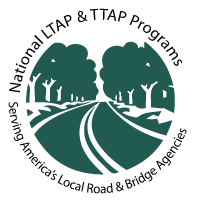The National LTAP Strategic Plan:
Vision
We will improve the quality and safety of the surface transportation system through interactive relationships and information exchange. We will be driven by these relationships and known for our ability to enrich the knowledge base of our stakeholders.
Mission
To foster a safe, efficient, and environmentally sound surface transportation system by improving skills and increasing knowledge of the transportation workforce and decision makers.
About LTAP
The Local Technical Assistance Program (LTAP) was established by the Federal Highway Administration (FHWA) in 1982 in response to a recognized need for funding and technical support to the 38,000 communities that maintain local roads and bridges. Each state in the U.S operates an LTAP center. Most of the centers are located at state universities, and many are co-located with University Transportation Centers (UTCs). There are also seven regional Tribal Technical Assistance Program (TTAP) centers which serve Tribal councils of government. LTAP centers enable local counties, parishes, townships, cities and towns to improve their roads and bridges by supplying them with a variety of training programs; new and existing technology updates; and personalized technical assistance. Through these core services, LTAP centers provide access to training and information that may not otherwise be accessible. Centers provide local communities with:
- Work force development services
- Resources to enhance safety and security
- Solutions to environmental, congestion, capacity and other issues
- Technical publications
- Training videos and materials
- Reach over 12,500 local communities
- Train more than 115,000 people at over 4,000 training sessions
- Send newsletters to more than 131,000 local contacts
- Distribute 250,000 materials to local agencies
Each mile of road that connects friends and neighbors, moves goods and services, and insures timely response for public health, safety and security has benefited from the services LTAP provides.
The LTAP Focus Areas
Safety is a primary concern of every part of the surface transportation system, with focus from local, tribal, state and Federal government partners as well as the private and commercial sector. The LTAP centers are located in academic institutions as well as State DOTs, linking us to the transportation workforce. As educators and information sharers, the program is an important cog in the Workforce Development cycle; as the transportation sector struggles to attract, retain and retrain present and future workers.
Infrastructure Management gets at the heart of the local and tribal agency situation – developing strategies that maximize the performance of their infrastructure while minimizing any negative effects on financial and human resources. Finally, Value Delivery is central to our program. The ability to efficiently transfer technology and information through courses and relationships to our partners and customers – whether they are local or tribal governments, state DOTs, or private concerns – is the primary measure of success.




